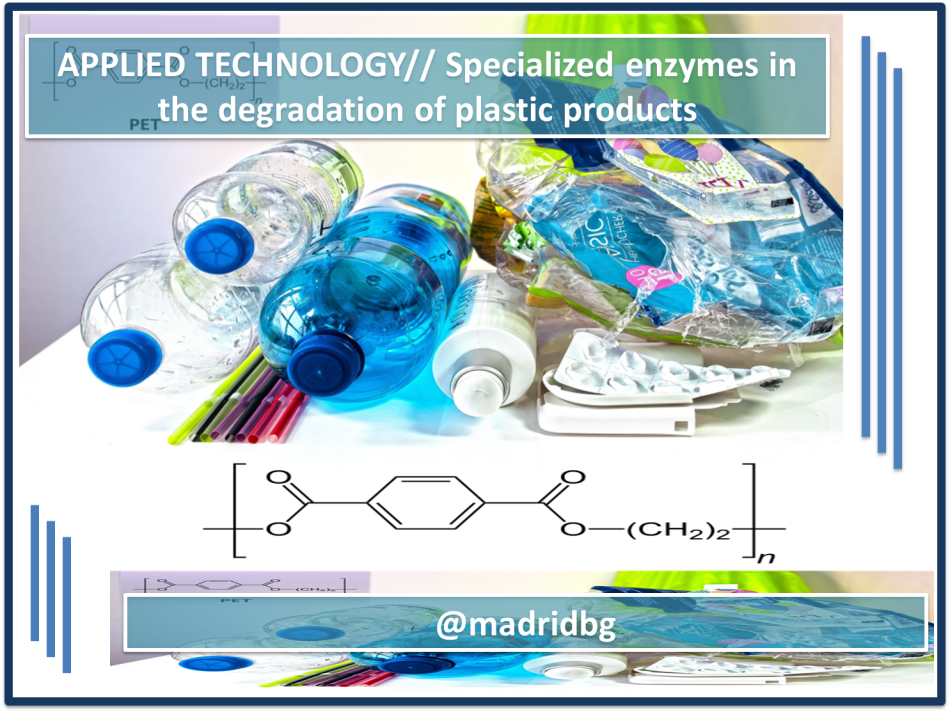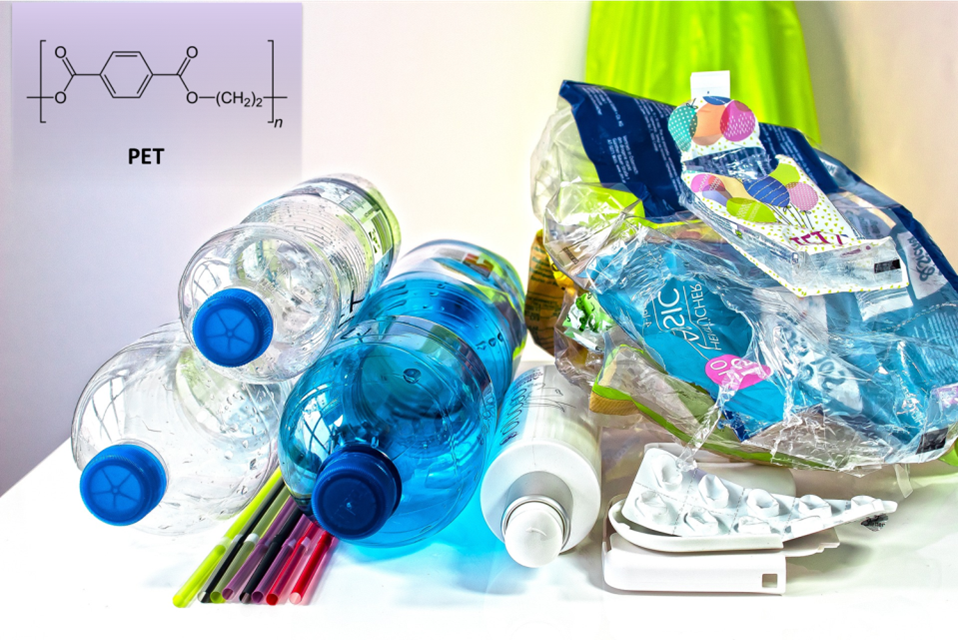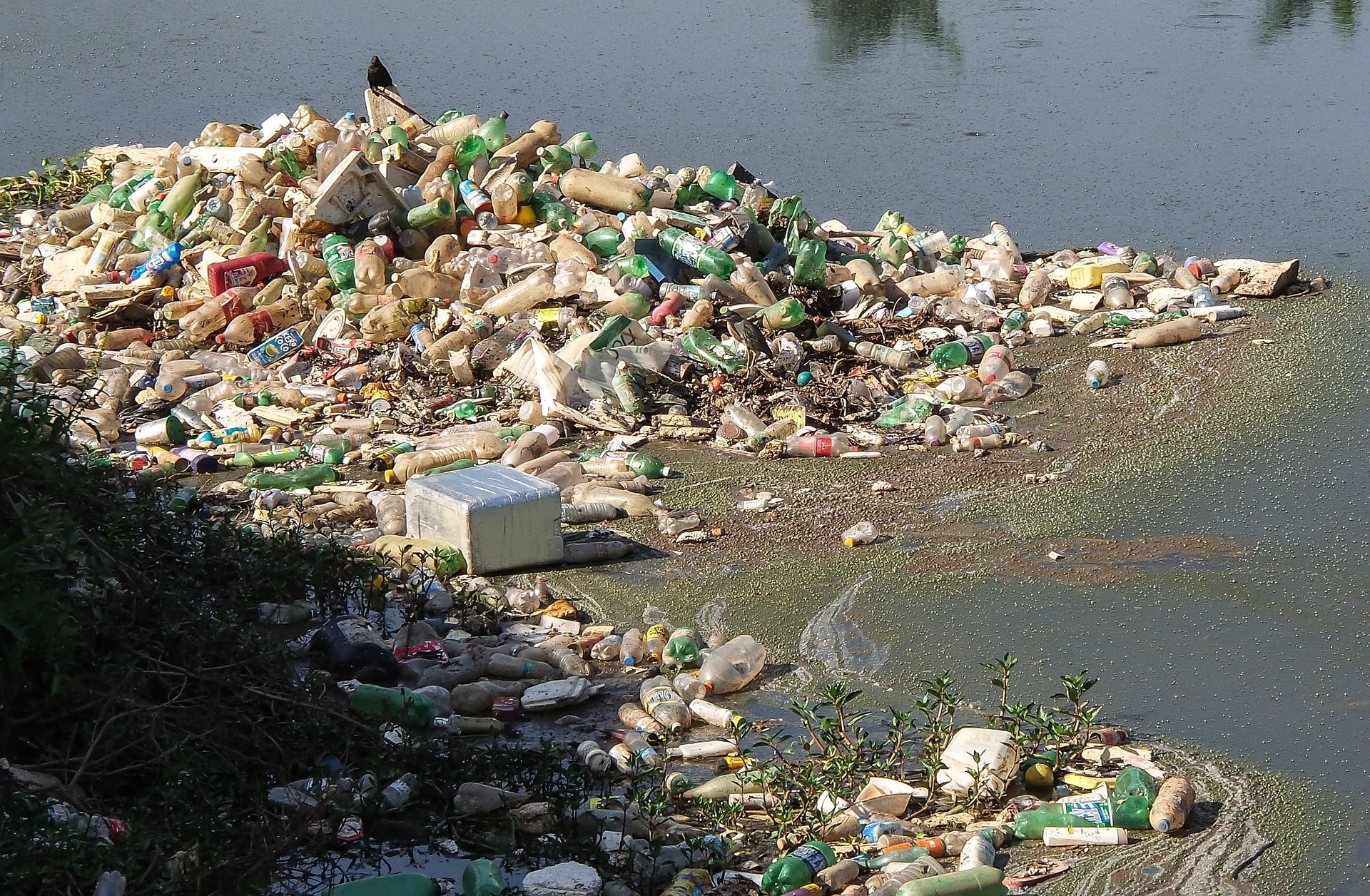APPLIED TECHNOLOGY// Specialized enzymes in the degradation of plastic products

Author: @madridbg, through Power Point 2010, using public domain images.
Greetings dear members of the community @project.hope, as it has been constant we will continue with the socialization of contents of technological character with projections on the preservation and environmental care.
In this sense, we will be addressing the use of enzymes in the degradation of plastic materials that have caused environmental damage due to the exaggerated amount of this material produced daily. Plastic products used to package beverages, oils, textiles, among others, are chemically constituted by polyethylene terephthalate, better known as PET, which is a chemical polymer of synthetic nature, which are obtained through reactions or chain condensation techniques, using terephthalic acid and ethylene glycol.

Fig. 2. Structural representation of the chemical compound PET, applied to the elaboration of plastic materials. Author: Thanks for your Like • donations welcome
According to the properties of the material, it has a wide variety of uses and because of this excessive use it has become a focus of potential contamination, since its useful life is short, although its degradation process is extremely long so it is considered a non-biodegradable material.

Fig. 3. Plastic materials have become a source of pollution that threatens the planetary balance. Author: Rafael_Neddermeyer
Similarly the recycling and use of these materials has not been standardized, therefore there are few tons that enter again to an industrial production gear where they are transformed into new materials acts for consumption.

Fig. 4. Efforts must be made to include the waste generated in a gearing and production system that allows a second use for these materials. Author: PIRO4D
In this sense, after research carried out in the United Kingdom in conjunction with American researchers, it has been possible to reduce the degradation of plastic materials from years to days, through the use of enzymes that catalyze the process and which they have called "plastic-eating enzymes".
This enzyme plays an important role in environmental care, because through their work, decompose the plastic in its simplest components, being these harmless to the environment and giving a second chance to the biotic systems of our planet, as it marks a reduction in the presence of plastic components in our environment.

Fig. 5. The emergence of this initiative provides an opportunity to improve planetary conditions, provided it is applied on a large scale. Author: Gerd Altmann
As if this were not enough, the team led by Professor John McGeehan, a specialist in enzymatic innovation, and Gregg Beckham, a researcher in the areas of renewable energy, decided to make the work of peptase more affective and dynamic and they use it in the company of the enzyme MHETASE, a duo that produces an amazing degradation process at speeds never before seen, the interaction between these two substances allows them to be considered as super-enzymes.
Undoubtedly, from my perspective, the work done by these enzymes and the discovery made so far, are a door of hope to the global problem of plastic waste that has generated so much damage to our planet. Therefore, I invite you to leave your opinion on the published topic.
BIBLIOGRAPHY CONSULTED
[1] Barrier, D and Col. (2013). Production of partially degradable plastic with high density polyethylene (HDPE) and the waste dextrin of Solanum tuberosum Química Viva, vol. 12, no. 1, pp. 27-38. University of Buenos Aires. Argentina. Article: Online Access
[2] Peponi, L and Col. Enzymatic polymerization for the synthesis of biopolymers. Institute of Polymer Science and Technology. Article: Online Access
OF INTEREST
•

Grateful with the community @project.hope and with all the management team of the same one that they motivate us to continue working in a mutual and balanced growth.


0
0
0.000
https://twitter.com/BGMadrid/status/1336046561470582785
#posh twitter
https://twitter.com/BGMadrid/status/1336046561470582785?s=20
@tipu curate 4
Upvoted 👌 (Mana: 56/112) Liquid rewards.
Hi @madridbg
Definitely a significant step in the search for a solution to this problem.
Our house (the Earth) must be taken care of and these advances to attack a problem as worrying as the contamination of the environment by plastic materials must be applauded and spread to make the world population aware.
Thank you very much for this excellent work.
Greetings and thanks for your comment @janettyanez, no doubt the technological advances in terms of environmental care and preservation should be applauded and encouraged by the top government cabinets and by different sectors of society in general, from my perspective it is a light behind so much darkness and environmental pollution. We continue reading